Why a Fertilizer Dashboard for Kenya?
VIFAA Going Forward
In November 2022, AfricaFertilizer (AFO), our partner on the Visualizing Insights on Fertilizer for African Agriculture (VIFAA) program, rebranded and launched a new website. This website includes the integration of country-specific VIFAA dashboards, which were previously housed in separate websites. By integrating the country-specific dashboards as well as fertilizer data on trade, production, consumption, and retail prices for 18 countries in sub-Saharan Africa, the new AFO data allows easier comparative analysis across countries and contributes its quota to the advancement of food security throughout Africa.
We have updated the previous country-specific dashboards links to now redirect you to AFO’s new website in order to ensure you are accessing the most up-to-date resources.
Yesterday, we launched the Visualizing Insights for African Agriculture (VIFAA) Dashboard in Kenya. Tracking information from fertilizer price to consumption, the new dashboard makes Kenya’s fertilizer data easier to access, use, and share for national and county level decision making.
Below, Grace Chilande of AFO and IFDC explains why the VIFAA dashboard is needed and how it will be used.
We are proud to have launched the VIFAA dashboard in partnership with Africafertilizer.org (AFO), the International Fertilizer Development Center (IFDC), the Kenya Ministry of Agriculture, Livestock and Fisheries, county governments, numerous private sector companies, and development partners.
Share
Related Posts
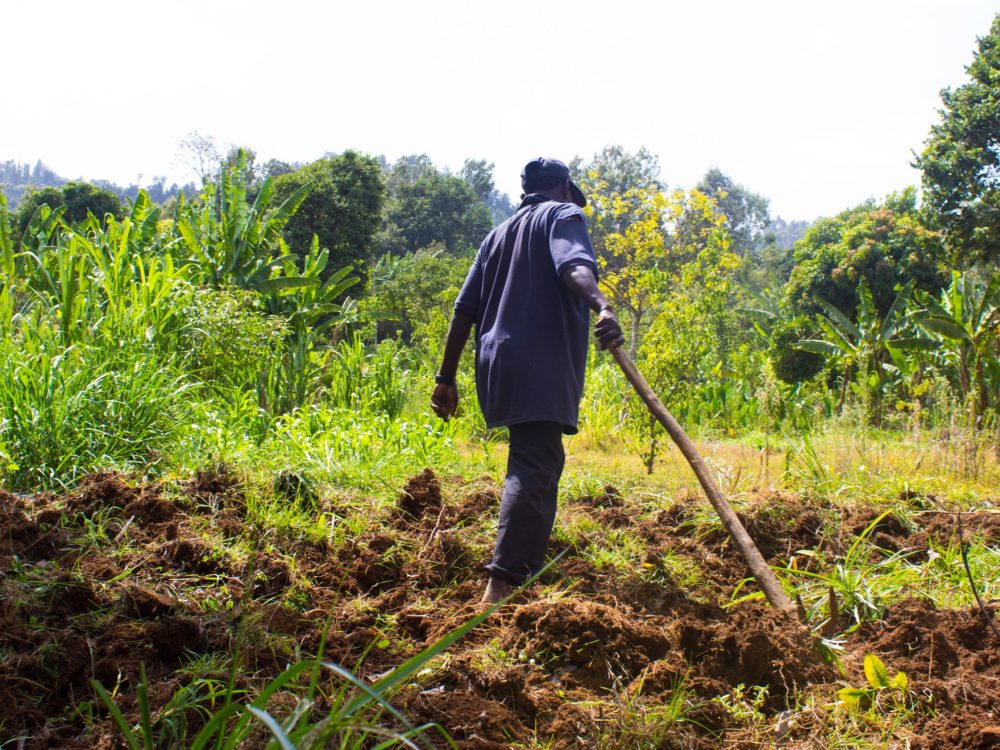
Reflecting on 3 Years of Digital Advisory Support for Agricultural Transformation
As the DAS program concludes, this blog reflects on its impact in advancing digital transformation in agriculture, highlighting lessons on capacity building, knowledge transfer, and sustaining resilient food systems.
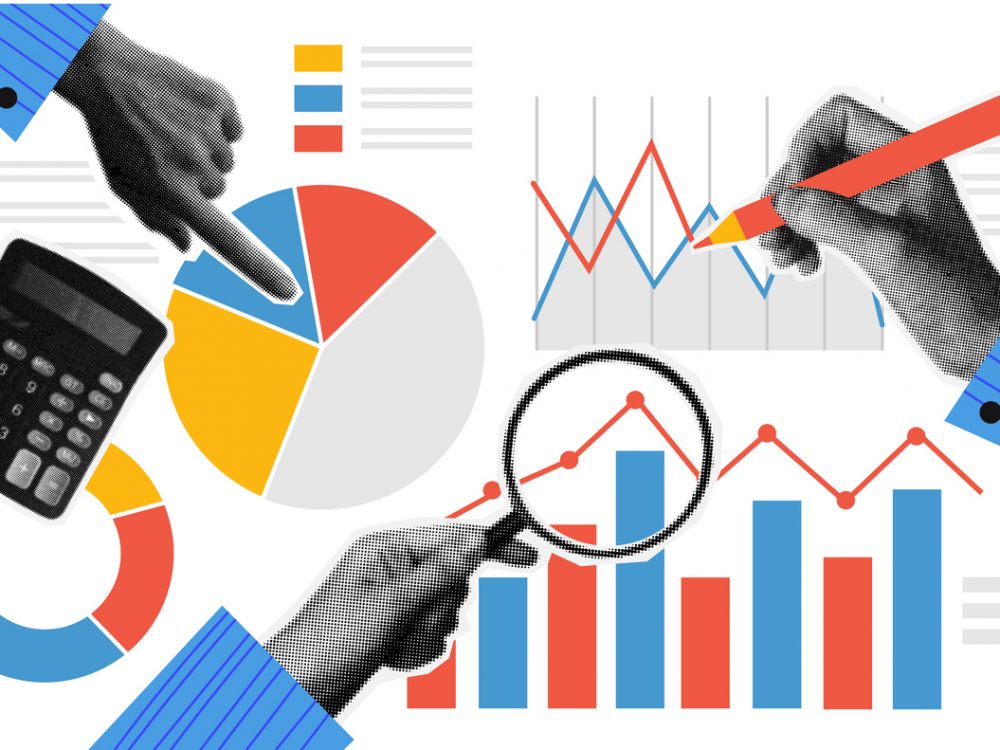
From Data to Impact: Why Data Visualization Matters in Agriculture
This blog explores why data alone isn’t enough; what matters is turning it into usable insights. In agriculture, where decisions have lasting impacts, user-friendly tools help farmers and policymakers alike make better choices.

From Standardization to Specificity: Localizing Multi-Country Research
Multi-country research must balance consistency with local realities. While standardization allows reliable comparisons and generalizable insights, local context shapes outcomes. This blog explores how programs can strike that balance effectively.
In multi-country research programs, one of the central challenges is finding the right balance between maintaining consistency across countries and adapting to local contexts that may influence research outcomes. When all participating countries pursue the same research goals, standardization becomes especially important, as it enables tools and protocols that allow for reliable comparisons and generalizable insights.
However, the need for comparability must be weighed against the importance of specificity: adapting research approaches to reflect each country’s unique cultural, social, and environmental factors. Tailoring research in this way ensures contextual accuracy, fosters stakeholder engagement, and enhances the relevance of findings. Although local adaptation often requires more time and resources, choosing one at the expense of the other can limit the effectiveness of research, as excessive uniformity can diminish essential local nuances while too much customization can undermine cross-country learning.
Striking the right balance between a uniform research structure and meaningful country-level customization is essential to producing useful, actionable results that resonate across diverse settings. That’s why, at Development Gateway, one of our core priorities is ensuring that program outcomes remain closely aligned with our partners’ evolving needs. This requires designing research frameworks that support shared aims across multiple countries, while also adapting these to account for each country’s distinct priorities, operational environments, and key stakeholders.
In the context of the Data on Youth and Tobacco Program (DaYTA), a tobacco control program gathering data on tobacco use among 10- to 17-year-olds in Kenya, Nigeria, and the DRC, we achieved this balance through our commitment to co-designing in collaboration with partners in governments, civil society, and academia. Building on the success of our cross-country co-design process, which culminated in the inaugural cross-country workshop in Naivasha, Kenya, in October 2023, we replicated this co-design structure when validating the preliminary results. As in the previous phase, we began by hosting a series of country-specific workshops, followed by a second annual cross-country workshop, held in Lagos, Nigeria, in November 2024.
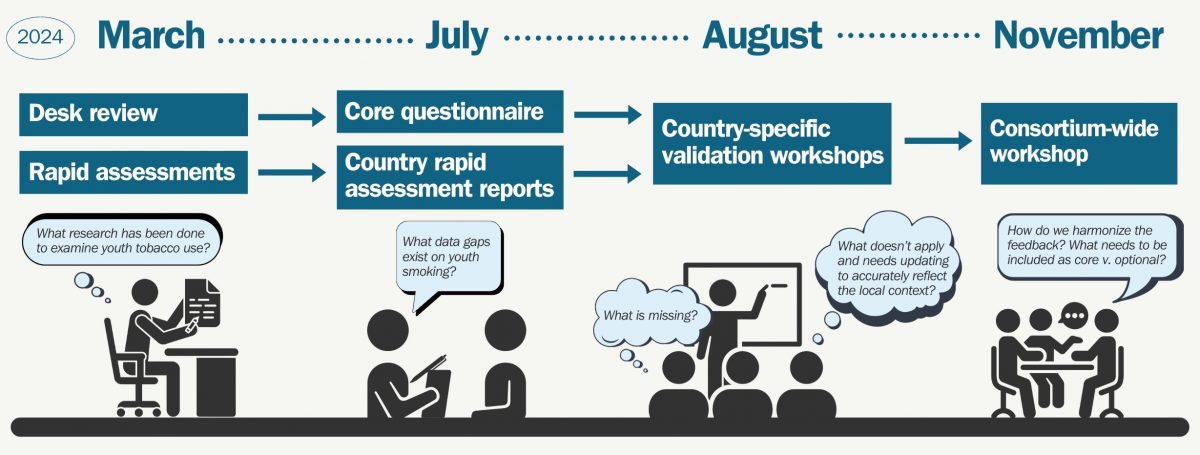
DaYTA Co-Design Process Timeline
Insights for making the results of a standard research protocol usable at every level
1. Scheduling a series of country-specific workshops, culminating in a cross-country workshop, pays off: Now in its second iteration, this model is already proving effective, especially in terms of ensuring stakeholder buy-in. Bringing together a group of 30+ participants in each country to discuss their country’s priorities, followed by a five-member delegation from each country convening annually to discuss shared objectives – from co-design to data validation and beyond – has been vital to fostering shared ownership of the results.
The first iteration of this process enabled stakeholders to better understand and support the cross-country approach to designing the DaYTA survey. As a result, all countries adopted the optional components – nicotine pouches, secondhand smoke, and cessation – during the co-design phase. These components helped capture nuanced insights, complementing the core survey questions, and were available for countries to include in their national questionnaires based on their specific needs and priorities.
This commitment to cross-country comparability came full circle during the results validation stage, when stakeholders from each implementing country were able to review their national findings within the context of broader regional data, made possible by the high level of standardization maintained throughout the process.
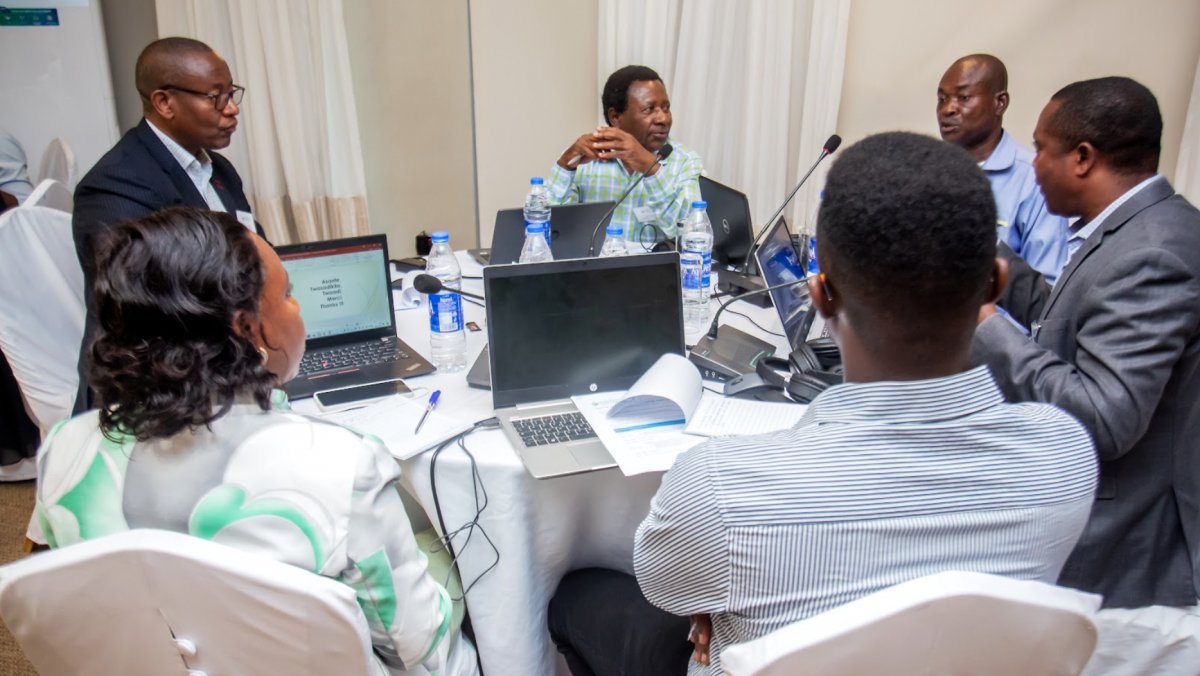
DRC stakeholders reflecting on the DaYTA survey’s design and objectives during a breakout session
2. Engagement with subnational governments needs to be integrated throughout the whole process: Given the decentralized nature of governance structures in countries like Nigeria and Kenya, we made concerted efforts to involve subnational representatives in the country-specific steps of DaYTA’s program design. However, participation remained limited. In response, and in close collaboration with our national-level representatives, we prioritized the implementation of high-quality, nationally representative surveys in each country.
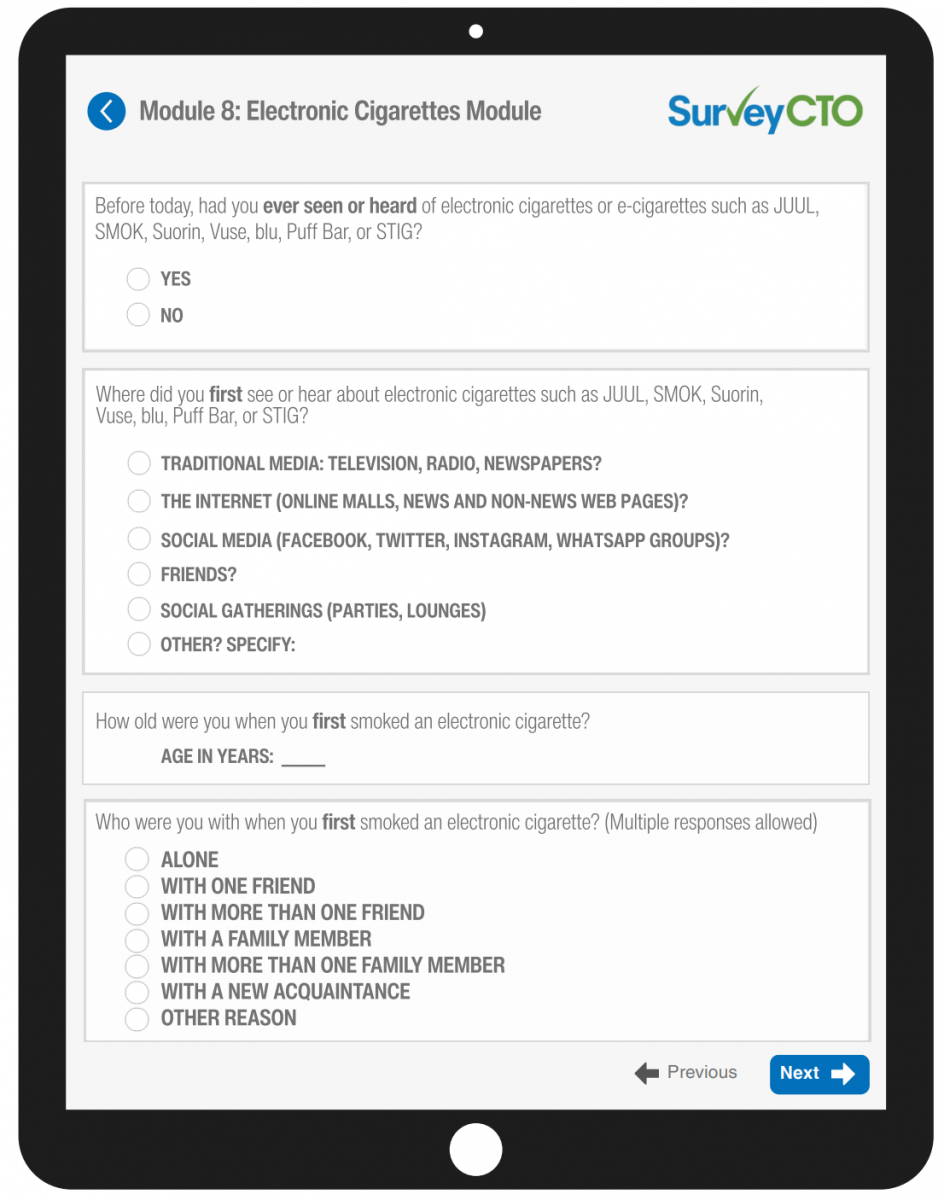
Design of a sample survey module in SurveyCTO
As a result, we have been able to convene county and state representatives in Kenya and Nigeria through the country-specific results validation workshops, providing valuable insights into their data use and dissemination needs. Moving forward, we will need to present national-level prevalence figures in ways that also resonate at the subnational level, while refining our messaging to align more closely with state and county priorities.
3. Making the data meaningful for youth may require a shift in strategy: Throughout the program, we have relied on our established stakeholder strategy and research process, actively involving youth in every step, from co-designing the protocol to pretesting the questionnaire. Yet, it is becoming increasingly clear that, to ensure our results resonate with young people, we will need to further adapt our dissemination approach.
This was highlighted by the youth panel at the cross-country convening, where panelists emphasized that engaging young people requires a different strategy than what we typically use for policymakers and researchers. Rather than dense text and jargon-heavy reports, young audiences respond better to visually engaging data, such as graphs and charts, and storytelling that simplifies complex findings and makes the information more accessible.
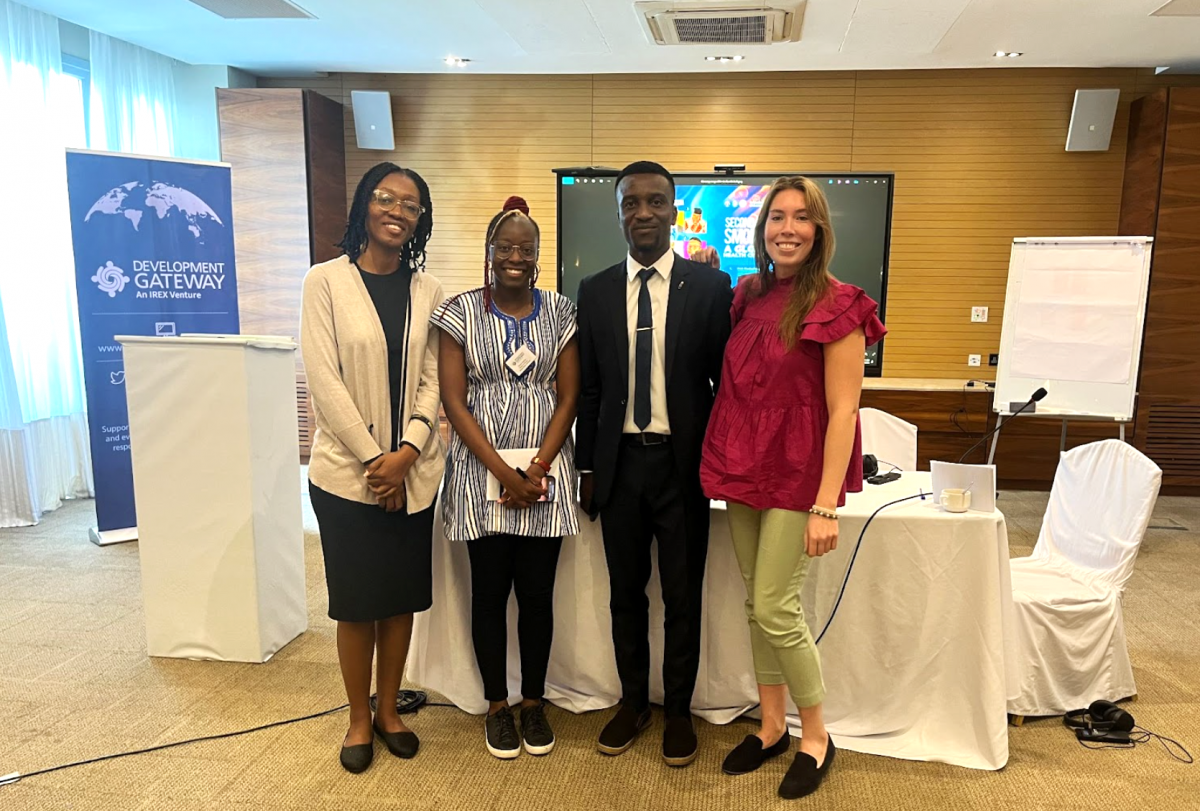
Pictured from left to right: Esther Aghotor, Elvina Majiwa, Joshua Ajaefobi, and Cecelia Yost
The youth panel featured Joshua Ajaefobi, President of the University of Abuja Tobacco-Free Club, Esther Aghotor, Vice President and Director of People, Creative, and Strategy at Gatefield, and Elvina Majiwa, Tobacco Control Advocate at Youth in Power, Africa Rise (YIPAR).
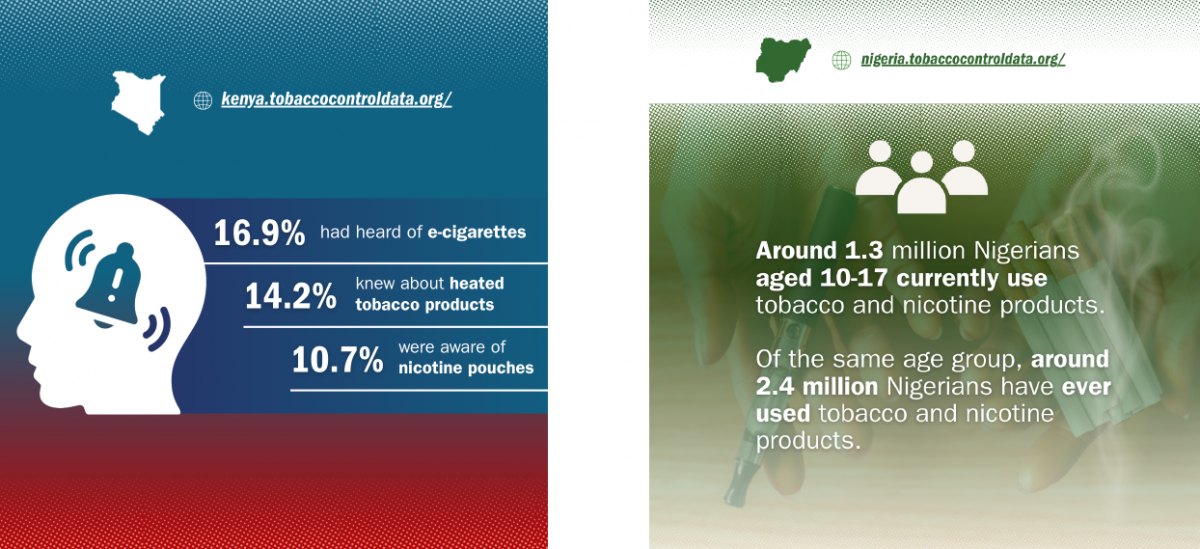
DaYTA infographics developed for previous social media campaigns
By combining clear visuals with compelling narratives, we can present DaYTA’s findings in ways that capture young people’s attention and ensure they better understand the data. In the coming months, we will draw on our youth partners’ expertise to help refine our approach and tailor our messaging, ensuring we can disseminate the data more effectively within their youth advocacy networks.
Looking ahead
With the successful completion of this multi-level data validation process, the DaYTA program is now poised to enter a pivotal phase: the strategic dissemination of its research findings, which can be accessed through the new youth-specific pages on the Kenya, DRC and Nigeria Tobacco Control Data Initiative (TCDI) sites.
This next step for the program will be to connect the data with both youth and policymakers to inform their tobacco control efforts. A key example is Kenya’s adolescent health policy. At the cross-country convening in November 2024, Dr. Christine Wambugu, Division Head of Adolescent and School Health at Kenya’s Ministry of Health, underscored the challenges posed by emerging tobacco products. She noted that Kenya’s 2019 Adolescent Mental Health Survey overlooked these products and their usage patterns, making the new DaYTA study invaluable in filling this critical data gap. Through its identification of tobacco use as a risk factor, this study will directly inform future policy decisions aimed at safeguarding youth health.
By fostering ongoing dialogue and collaboration across Kenya, Nigeria, and the DRC, DaYTA is fostering a community of practice centered in tobacco control in the region. This approach will not only enhance the relevance of tobacco control strategies but also increase their effectiveness, ultimately driving more impactful and lasting change.
“Research on adolescent tobacco use in the DRC is essential for guiding effective prevention measures. Through collaboration with Development Gateway, the National Institute of Public Health strengthens its role in data dissemination, enabling targeted actions to protect active and passive smokers, as well as the entire population.” – David Kayembe, Professor at the National Institute of Public Health (DRC)
